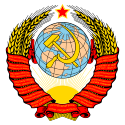- Soviet of the Union
-
Soviet of the Union (Russian: Сове́т Сою́за, Sovet Soyuza[1]), was one of the two chambers of the Supreme Soviet of the Union of Soviet Socialist Republics, elected on the basis of universal, equal and direct suffrage by secret ballot in accordance with the principles of Soviet democracy, and with the rule that there be one deputy for every 300,000 people (until Glasnost and the 1989 elections however, only the communist candidates were permitted to participate in the elections). As opposed to the Soviet of Nationalities, the Soviet of the Union represented the interests of all of the people of the Soviet Union no matter what their nationality was.
The Soviet of the Union had the same rights and competence as the Soviet of Nationalities, including the right for legislative initiative.
The Soviet of the Union elected a chairman (who would lead the sessions of the chamber), his 4 deputies and permanent commissions: Mandates, Legislative Proposals, Budget Planning, Foreign Affairs, Youth Affairs, Industry, Transportation and Communications, Construction and Industry of Building Materials, Agriculture, Consumer goods, Public Education, Healthcare and Social Security, Science and Culture, Trade, Consumer Service and Municipal Economy, Environment.
See also
- Chairman of the Soviet of the Union
- 1977 Soviet Constitution
- 1936 Soviet Constitution
References
- ^ Ukrainian: Рада Союзу; Belarusian: Савет Саюза; Kazakh: Одақ Кеңесі; Lithuanian: Sajungos Taryba; Moldovan: Cовиетул Униуний; Latvian: Savienības Padome; Estonian: Liidu Nõukogu
Categories:- Government of the Soviet Union
- Historical legislatures
- 1938 establishments in the Soviet Union
- 1991 disestablishments
Wikimedia Foundation. 2010.

